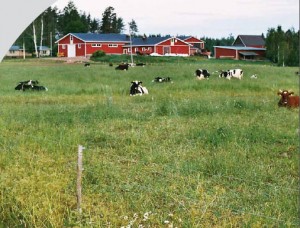Farmer well-being is important
 While farmers’ well-being at work is not directly visible to the consumer, it forms an important part of responsible food production.
While farmers’ well-being at work is not directly visible to the consumer, it forms an important part of responsible food production.
In her doctoral dissertation, Marja Kallioniemi, research scientist at MTT Agrifood Research Finland, found that farmers regard their daily routine as rewarding, despite the burden that it puts on them.
With regard to symptoms related to mental health and well-being, farmers most commonly suffer from symptoms of weakness, fatigue and sleeping problems.
The study also found a link between symptoms related to mental well-being and pesticide use. The research determined that full-time farmers experience less stress than the average for the working-age population in Finland.
However, the industry’s ongoing structural change, along with increased risks related to farming, bring workload factors to farmers’ day-to-day lives. Such risks are caused by price fluctuations, the advancing climate change and the need to master a large repertoire of skills required of running a farm with its diversity of functions and an enlarged size.
Farmers are most burdened by problems related to their farms’ economic situation, various regulations that govern farming, the administration accompanying agricultural policy, weather and natural conditions, and the hazards encountered in the work environment, comments Kallioniemi, referring to her and her co-author’s literary survey.
Kallioniemi and her colleagues found in theirqualitative study that significant differences exist in the number of accidents from one dairy farm to the next.
A close interactive relationship with animals, following of certain procedures in animal handling, and across-the-board avoidance of factors that could cause stress to animals help to create safe working conditions for the animal handler.
Knowledge of animal well-being and animals’ natural behaviour contributes to the forming of an interactive relationship, furthering occupational safety.
In 2012, 43% of all work-related accidents affecting Finnish farm entrepreneurs occurred in connection with animal-handling work.
The important role of women in agriculture
Animal handlers’ well-being is linked to occupational safety, quality of foodstuffs and animal well-being. Women working on farms play an important role as stewards of animal well-being and promoters of sustainable agriculture.
In the study, female farm workers reported that the tasks they carry out vary considerably in nature, and that they work long days with varied content and reflect on their ability to cope with the workload.
To most women, working with production animals, close to nature, was gratifying.
In 2007, the number of women working on Finnish farms came to nearly 49, 000, accounting for 34% of all people working on farms.
Women’s contribution to agriculture should not be belittled or underrated, yet old modes of thinking continue to affect daily life.
While most women would prefer to use “farm entrepreneur”as their title, their professional status often remains unspecified or is misunderstood. Nevertheless, women have open-mindedly and successfully managed to change the conditions to match their needs, comments Kallioniemi.
The link between pesticide use and problems with mental well-being
Results from the 2004 survey revealed problems in well-being at work, with roughly every fourth full-time farmer experiencing feelings of weakness or fatigue and every fifth having trouble sleeping.
Both symptoms had become more common since the previous study. Linked with these symptoms were problems in social interaction and general health problems. Furthermore, spraying of pesticides for the span of more than two weeks during the previous growing season was found to have an association with symptoms indicating problems with mental well-being.
Indeed, international research literature has shown numerous results pointing to a connection between pesticide use and problems with farmers’ mental well-being, including depression.
Intervention in problems related to well-being at work and taking remedial action are hampered by the long distances, typical of rural areas, modes of thinking that emphasise self-sufficiency and self-dependence, and prejudices and the stigma associated with mental problems, concludes Kallioniemi.
Based on two sets of data, the doctoral dissertation draws on previously published articles in its examination on well-being at work on Finnish farms. The first data set from a survey conducted in 2004 covers responses from 1,182 full-time farmers.
Qualitative in nature, the second set of research material, gathered in summer 2007, consists of 10 interviews along with data obtained from observation of work on dairy farms. The research subjects were women working on farms.
Marja Kallioniemi, Master of Science (Agriculture and Forestry), will defend her doctoral dissertation, “Well-being at Work on Farms in Finland, Stress, Safety in Animal Handling and Working Conditions of Women on Dairy Farms” (in Finnish “Työhyvinvointi maatiloilla, Stressi, työturvallisuus eläinten hoitotyössä ja naisten työolosuhteet maidontuotantotiloilla”), at the Faculty of Agriculture and Forestry of the University of Helsinki on 31 August 2013, at 12:00 p.m. Docent Kaisa Kauppinen, of the University of Helsinki, will serve as the opponent, with Professor Jukka Ahokas, of the University of Helsinki, acting as the custos.
